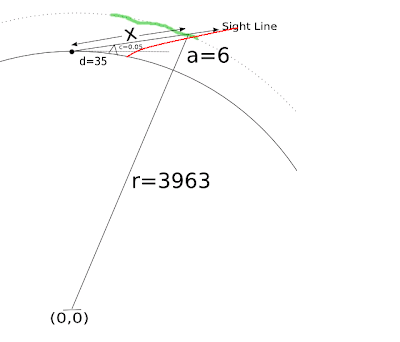As I find more diverse sources to add to my information on this possible missile launch off of California last week, I am leaning in the direction of the naysayers and say, that this is probably a commercial jet. Some blog sites even list the possible Commercial Carrier and Plane ID number. Given the military has capabilities that Martians don't know of, why couldn't they come up with this type of data from ATC within the first 48 hours. After one day and a half, all they could say was it wasn't a threat to the United States, but we still aren't sure what it is....The military did go so far as to say, this contrail didn't belong to them. Okay.
Now we have here a plethora of data from a guy that has his website geared primarily towards deciphering contrails. So, in the middle of this episode, he has a diagram detailing the effects of an optical illusion, as what this episode is being labeled by the specialists that know rockets and airplanes.
I will modify his diagram with one launch trajectory in red that would also show this as a rocket launch and not an optical illusion (just for kicks--playing the devil's advocate here). Most of the experts say this object was much too slow for a missile, but with this trajectory I laid out, it would give the reason of being slow to an observer, yet still be a missile. ....lakotahope~~~~~~~~~~~~~~~~~~~~~~~~~~~~~~~~~~~~~~~~~~~~~~~~~~~~~~~~~~~~~~~~~~~~~~~
FROM CONTRAIL SCIENCE
[This post was originally from Jan 19th, 2010. I've updated it with information about the "Mystery Missile" contrail of Nov 8, 2010, at the bottom of this post. Clearly it's the same thing]
An interesting contrail cropped up off the coast of San Clemente, Orange County, California on December 31st 2009. The curious shape led some people to think it’s a missile launch, which it does kind of look like (all taken from San Clemente)

"Missile-like" contrail. Note this is the Dec 31st contrail, not the Nov 8th CBS one. That's at the bottom of the post.

Here’s some more shots of the same contrail. Click these for larger images:


The idea that it’s a missile launch comes from three misconceptions. Firstly that the trail is vertical – it’s not, it’s a horizontal trail, at around 32,000 feet (about six miles). It’s the same as this:

This contrail is no more vertical than the road is, and nor are the power lines at 45 degrees. Everything is horizontal – it’s the just the angle you are viewing it from. All of these show horizontal contrails.
Secondly there’s the misconception of direction, that it’s flying away from the viewer, when it’s actually flying towards the viewer. This is because the “base” of the contrail seems wider than the tip. Perspective tells the brain that this mean the base is closer. But actually you can see the base has been greatly spread by the wind. Since it’s so far away the effects of perspective are greatly diminished, meaning the actual width of the contrail is what is creating the illusion. Imagine if a plane with a 100 mile long spreading contrail were coming towards you; what would it look like? It would look exactly like this.
Thirdly there’s the idea that it goes all the way down to the ground. Now that might be true if the Earth was flat, but the Earth is round, and things go beneath the horizon eventually, no matter how high they are. A plane 200 miles away but five miles up is always below the horizon. If the horizon is raised (as it is here, with Catalina Island), then the distance is less. Here’s some math:

--------------------------------
This diagram is not to scale, but the math is the same regardless. The solid curved line is the surface of the earth. The dot at the top is San Clemente. The little triangle is Catalina. “d” is the distance to Catalina (d=35 miles). “c” the amount of Catalina that is visible above the horizon (c=0.05 miles, really a bit more, but let’s be conservative). “a” is the altitude of the plane, (a = 6 miles). “r” is the radius of the earth (r=3963 miles).
The green wavy line is the contrail. Notice it’s at a fixed height above the surface of the earth, and is going directly towards the OC.
The point labeled (0,0) is the center of the earth. (0,0) means X=0, Y=0, where X is horizontal and Y is vertical. What we want to know is how far away the plane is, the value x. We do this with cartesian geometry, noting that the lowest visible point of the trail is at the intersection of the dotted line, which is a circle of radius (r+a), hence the equation x^2 + y^2 = (r+a)^2 and the line labeled “sight line”, which is has the equation y=r+x*c/d. Combining these equations to solve for x yields a quadratic equation, which we can solve with Wolfram Alpha:
intersection of (y=r+x*c/d) and (x^2+y^2 = (r+a)^2)
and with the real numbers:
intersection of (y=r+x*c/d) and (x^2+y^2 = (r+a)^2) where a=6 and d=35 and c=0.05 and r=3963
Which gives x = 212, meaning that the bottom of the contrail is around 200 miles away. So if the front of the contrail (the actual aircraft) is somewhere above and behind catalina, then that means the contrail is over 100 miles long. At 500 mph, that means it could have formed in 12-15 minutes, which seems consistent with the descriptions in the discussion above. (feel free to play around with the numbers there to see the affect of various assumptions)
Looking at the satellite image for noon on that day (12/31/2009) and the next day (1/1/2010), we see contrails in approximately the same position, and around 100 miles long, showing it’s quite possible, given the right weather.


Really what makes this odd looking is the position of the people taking the photo. Obviously the same contrail would be visible all the way up the coast, however the only people who though it was really odd were those who were lined up with it, in OC. People in LA would see a dramatic looking contrail, but more obviously just a contrail, so less worthy of writing to the newspaper about. I actually saw it myself, but was in a car, and could only get a poor cell-phone snapshot:
And here’s some excellent points from a real rocket scientist, posting as “Michael”:
I’d like to add to all the evidence above that it was just a jet, because the plume is nothing like a rocket plume to the trained eye. I was a rocket safety inspector for 3 years, have seen countless launches and failures, and have a master’s degree in Astronautical Engineering. Here’s why it’s not a rocket:
It’s too slow (<— biggest reason).
There's no engine flare.
There's no expansion of the plume (as the chamber pressure exceeds the atmospheric pressure more and more during flight).
There's no staging event.
There's no sunset striations across the plume (which would look like this: http://tinyurl.com/2vklwu5).
In the wide shot there's two contrails (off each wing!) instead of one.
The plume at the plane is twirling in different directions (very un-rocket-like).
The plume at the plane is twirling too much — that only happens in the case of a motor burn-through, which is a failure mode, meaning it would be seconds from exploding if it were a rocket.
The wind-blown plume is all wrong, vertical plumes go through several different wind shear layers, which makes it look very different than what the video shows.
There is much more from this WEBSITE.
http://contrailscience.com/
For a complete and very informative presentation on this contrail episode and other contrail phenomenon, go to this site. You will not be disappointed. lakotahope






